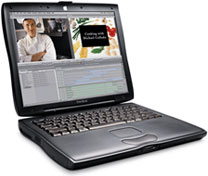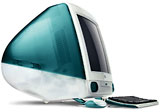 Computerworld's Mike Elgan posted a provocative Christmas Eve
piece on 10
Obsolete Technologies to Kill in 2010. The enthusiasm some folks
express for jettisoning allegedly "obsolete" technologies baffles me. I
like "mature" technology. For example, I'm editing this column on a 9+
year old Pismo
PowerBook that I fully expect to continue using for several years
yet.
Computerworld's Mike Elgan posted a provocative Christmas Eve
piece on 10
Obsolete Technologies to Kill in 2010. The enthusiasm some folks
express for jettisoning allegedly "obsolete" technologies baffles me. I
like "mature" technology. For example, I'm editing this column on a 9+
year old Pismo
PowerBook that I fully expect to continue using for several years
yet.
I'm not opposed to new innovations, provided they actually are an
improvement on what they displace, but that's often a subjective value
judgment, and I'm inclined to suspect that there's an element of
elitism in advocacy of abandoning older technology.
On the other hand, sometimes it really is time. Eight-track audio
(if you're old enough to remember that) was a technology whose time
arguably never came, but I don't miss buying recorded music on
frequently cranky, fragile cassette tape media either. However, I do
have and still use a cassette player from time to time for music I
haven't purchased on CD or in digital media formats.
 Steve
Jobs was right about floppy disks when he launched the original iMac in 1998 sans
floppy drive. I still have a couple of working Macs that support
floppies, but it's been literally years since I actually popped a
floppy into a drive.
Steve
Jobs was right about floppy disks when he launched the original iMac in 1998 sans
floppy drive. I still have a couple of working Macs that support
floppies, but it's been literally years since I actually popped a
floppy into a drive.
However, I think Mr. Jobs is mistaken in his zeal to abandon
FireWire, at least on "consumer" Macs. That may change when USB 3 comes
on stream, but for now, USB 2 is a mediocre substitute for FireWire. (I
have a FireWireless
MacBook.)
Back to Mike Elgan's "obsolete" technologies hit list.
Fax Machines
He's partly right about this one. In the years prior to the Internet
arriving in my neck of the woods in 1997 (dial-up only until a few
months ago), I used fax extensively, although from my Mac with the
excellent Global Village GlobalFax software. I've never owned an actual
freestanding fax machine and haven't used fax of any sort for a long
time. I find PDFs sent as email attachments are an excellent and
superior alternative, and the OS X Finder and print engine make it
easy to create PDF files from virtually any document.
However, I suspect that for some businesses and institutions, the
fax machine, clumsy and crew though it is, would still be
indispensable.
Cigaret Lighter Plugs
"Cigar lighter receptacle" plugs in cars? Not so fast. I don't smoke
or permit others to light up in my car, but I do have a bunch of
possessions - both automotive and digital gadgets - that came with
"cigar lighter" plugs on their power cords, and I wouldn't like to see
them rendered unusable.
The www. Prefix
The "www." phrase in Internet URL syntax? Sure, I'd be happy to see
that go, but I'm not certain what the potential obstacles would be to
giving it the heave-ho. In the meantime, I don't find typing the three
letters all at onerous or its presence on business cards and the like
at all offensive (or even annoying).
Business Cards
Speaking of business cards, Mike wants to deep six them too. Why? He
has his reasons, none of which I find convincing.
I like business cards. I have a pile of them in my desk drawer and
find them especially convenient when I want a phone number or address
and don't have a computer running.
Video Rental Stores
Here's an example of elitism, I say, speaking as one who still uses
VHS tape for a lot of TV time-shifting. There are still plenty of folks
who don't have broadband service or even access to it, as I didn't
until last September. I read somewhere recently that broadband
penetration in the US is still only 65%. That sounds low to me, but I
guess that not everyone who has access to broadband actually signs up
for the service. Here in my community, we've had high speed wireless
Internet for nearly four months now, but there are friends of mine who
are still using dial-up and profess no intent to subscribe to the
wireless service. In any case, there's a sizable month minority of the
population that has no practical alternative to movie rentals for that
sort of entertainment.
Editor's note: I can't speak to
the situation in Canada, but here in the States, my wife and I find
Netflix a great alternative to video stores. For $9 a month (plus
sales tax), we can watch two DVDs a week. That's about the cost of one
ticket to the local movie theatre, making it a cheap entertainment
option. Best of all, there's no need to put a computer in the living
room. dk
Remote Controls
Home entertainment remotes? I have five parked by my TV watching
sofa. It's a pain, and I could probably eliminate one or two by
programming multiple device functions into a universal remote, but I
find it less complicated to use the dedicated remotes that came with
the respective machines. The batteries last nearly forever - and
they're cheap to replace from the dollar store.
As for Elgan's suggested alternative of controlling everything from
your smartphone, I'm afraid that's über-elitism. It's a possible
alternative if you have a phone that's up to the job and have the
necessary software, one example of which was introduced at CES
yesterday in the form of an accessory and free app from L5 Technology that can turn any iPhone
or iPod touch into a universal remote control for televisions, DVDs,
DVRs, cable boxes, audio equipment, and most other products that come
with an infrared remote.
However, that doesn't really appeal to me. I don't even own an
iPhone. The nearest GSM coverage is about 30 miles away as the crow
flies, so they don't work here. Cellphone service is also, IMHO,
absurdly expensive here in Canada (more on this below). I'll stick with
my multiple remotes quite happily, probably for the duration.
Landline Phones
Which brings us to landline phones, another technology Elgan wants
to dispense with - to which I say an emphatic "no way!" Not in the
foreseeable future.
When cell service is competitively priced with landlines and as
dependable, come talk to me, but I'm skeptical that landlines will
disappear for at least another generation (of people - not phones). For
example, Bell Canada's cheapest iPhone service plan is C$45/month for
150 minutes and 500 MB of data on a 36 month contract. I pay $25 a
month for unlimited landline service with no contract lock-in. I detest
service contracts.
Elgan argues that 25% of US households no longer have landline
service, but that means that 75% still do. And what about emergency 911
service and DSL broadband, both of which require fixed locations and
hardwired connections?
Music CDs
Music CDs? As noted above, I still listen to music on cassette tape
from time to time. I don't particularly like CD media, and I've ripped
all the CDs I own with music that I still listen to into MP3 format to
play on the iPod or computer. However, I'm in no rush to do away with
the CD, not only for movie music distribution, but optical drives in
computers as well. I think there's a case for moving optical drive
support to peripheral devices, à la the MacBook Air and the Mac mini server, but for reasons
elaborated above, we're a long way from online distribution of
everything.
Satellite Radio
Satellite radio? I'm not a subscriber, but why kill a service many
people like and use? As for Internet-delivered radio over a cellphone,
he's got to be kidding! At those highway robbery rates providers charge
for data service?
Redundant Registration
Redundant registration - such having to type in your email address
and/or password twice to register or enter your city and state plus zip
code when the zip code already points to a certain city and state - is
one technological aggravation I'll agree on getting clear of if
security can be maintained (probably a big "if"). Happily, Apple has so
far maintained an enlightened registration policy for OS X.
Call me a Luddite if you want, but like I said, I'm in no hurry to
get rid of things that work, even when they're well back of the cutting
edge.

 Computerworld's Mike Elgan posted a provocative Christmas Eve
piece on
Computerworld's Mike Elgan posted a provocative Christmas Eve
piece on  Steve
Jobs was right about floppy disks when he launched
Steve
Jobs was right about floppy disks when he launched 
